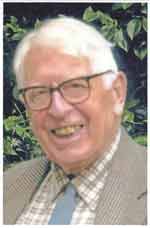Eugene Derek Griess
Born Sheffield 13th May 1913
Died Chelmsford 1st June 2006
A tribute by Fred Kenyon of Australia
Derek Griess was first and foremost an engineer who devoted his life to his profession in electronics. He epitomized the old style dedicated professional engineer who loved his work. In his day the Marconi Wireless Telegraph Company (M.W.T.) pioneered the introduction of communications and broadcasting systems all over the world. The role of a Marconi engineer was a very demanding one.
To arrive in a country on the other side of the earth with a pile of gear crated up in wooden boxes and then to have the sole responsibility to turn it into a working transmission system demanded great skill and dedication. We should perhaps remember that there were no satellite phones and contact with one’s base was either very difficult or impossible, telex’s and telegrams took time and often the man in the field was left to his own slender resources. There was no overtime and it was accepted that work twenty four hours a day seven days a week was the norm.
The staff available to help were often completely raw and needed training and frequently the proposed ON AIR date had been publicised so an expectant audience awaited the first transmission. After a long day Derek would pound away on a portable mechanical typewriter to send his reports back to Chelmsford often asking for spare parts or seeking a missing shipment. It was in this difficult role that Derek established many friends and admirers throughout the world. The Marconi types were a rare breed and Derek represented the best of them.
He had the ability to communicate with the head of the customers company or the cleaner often in another language. To them he was Mr Marconi and that company was indeed fortunate to have such a unique representative. There are many many tales of his exploits, for example during the war in the early forties he played a major role in defeating the German submarines then taking almost total control of the Atlantic. During this period he crossed the Atlantic many times during a very active war. He spent a great deal of time later in the Middle East and there is a story of the King of Jordan presenting Derek with a gold watch in gratitude for installing major communications systems for Jordan. But on his return to London when stopped by customs Derek was astounded when asked to pay duty on the King’s gift so he politely told the customs to keep it.
He was always willing to spend precious time explaining to a new recruit how something worked and never talked down to people. He greatly admired Albert Schweitzer and was very similar in many ways. Even in appearance and mannerisms perhaps it was his Alsatian background. He loved Bach organ music and Schweitzer in particular. But whereas Schweitzer was very much a dedicated Christian Derek with his intellectual background found faith difficult. But the interesting thing is that he lived his life with devotion to the highest possible ethical principles. His life was full of good deeds and kindness and thoughtful ness to others.
I would like to think that when he enters heaven there will be a big welcoming crowd of his family and friends and that he will be overwhelmed and amazed. I can see him saying now “But why did they let me in” and perhaps the man in charge might reply – Derek you obeyed the greatest commandment – Jesus said to his disciples “Love one another as I have loved you”. Derek you expressed love and help to so many in so many places and expected nothing in return.
